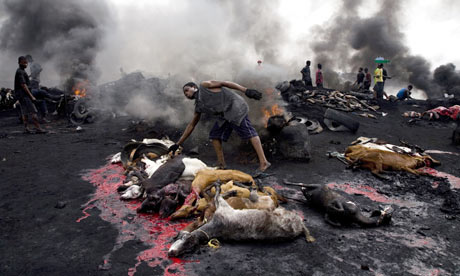Vital oil: photographer Ed Kashi captures Nigeria's toxic legacy
Violence, corruption, war ... photojournalist Ed Kashi charts the devastating effect of oil production on a west African nation
Blood and oil ... farmers in the Niger delta slaughter animals poisoned by local refineries. Photograph: Ed Kashi/Corbis
Curse of the Black Gold sounds like the title of an old-fashioned adventure novel by Edgar Rice Burroughs or Henry Rider Haggard. It is, in fact, an epic work of reportage by the photojournalist Ed Kashi that documents in photographs, essays and interviews (and even poems) the cost of 50 years of oil production in west Africa.
- Ed Kashi
- Curse of the Black Gold
- Host Gallery,
- London
- Until 3 April
- Details:
0207 253 2770- More information
Kashi's story has everything a writer of contemporary action-packed thrillers could ask for: political intrigue, unfettered global capitalism, corruption on a grand scale, violence, kidnapping, tribal warfare and ongoing ecological disaster. The setting is the vast Niger delta – 28,000 square miles of rainforest and mangrove swamp, a wetland of islands criss-crossed by countless rivers, tributaries, creeks and channels. It is a vast area of incredible biodiversity. In his brilliant introductory essay, Professor Michael Watts of the University of California, an expert on the region, writes that the delta is "comparable in grandeur and scale to the Mississippi, the Ganges and the Mekong".
It is also the source of most of America's oil, and the 11th-largest producer of crude oil in the world. In the 50 years since the first well was drilled there, the delta has become a place of extreme poverty, violence and political turmoil. In June 2006, Kashi experienced the danger first-hand when he was arrested by the military while photographing in the Nembe region and held illegally for four days. He also spent time travelling with the armed insurgents of Mend (Movement for the Emancipation of the Nile Delta) as they attempted to blow up oil pipelines.
During several visits there over a five-year period, Kashi photographed tribal chiefs, warlords, oil workers and the many devastated oil-stained shanty towns where local people scrape out a living. One of Kashi's panoramic pictures shows a town that stands literally in the shadow of a huge oil refinery. As metaphors go, it's a striking one.
When I interviewed Kashi recently before an audience at the Frontline Club, he was quick to point out that it's too easy to blame giant oil companies such as Shell and Total. In Nigeria, he said, corruption was endemic to the point of being self-defeating. Watts echoes this view in his introduction, going on to rail against the cataclysmic effect of black gold on Nigeria as a whole.
"The deployment of oil wealth to purchase local political consent through massive corruption and state multiplication has probably prevented another war or state collapse. At the same time, it has fuelled a sort of dispersion and fragmentation seen in the hardening of local and ethnic identities, and, in the Niger delta, in the explosion of insurgent politics. All this has contributed to a profound sense of the unravelling – the un-imagining – of Nigeria as a nation." The cost of oil, in short, has been nothing less than the cost of the nation's soul.
This is complex terrain for a photography book and Kashi knows it. His images speak for themselves in their depiction of the horrendous and sordid consequences of oil exploitation. The book also contains writings by local Nigerians: political activists, poets and insurgent leaders. To appreciate it fully, you must spend time pulling all the interwoven strands together – the history, politics, poetry, photographs.
Kashi, like many other contemporary photojournalists, practises what he calls "advocacy journalism". He works with NGOs and local activists to disseminate his images through local communities in west Africa, exhibiting them in the very communities he has worked with. In the US, when he is not taking photographs, he is undertaking speaking tours, holding workshops and making films. Alongside his wife, he runs Talking Eyes Media, a multimedia company that aims to "deliver issue-oriented stories to the general public." As part of the event at the Frontline Club, he showed his astonishing Kurdistan Flipbook, a short film about the plight of the Iraqi Kurds made from thousands of still images.
Kashi, then, is an emphatically contemporary kind of reportage photographer, but he is driven by old-fashioned liberal ideals and the singular intensity of purpose that drives every campaigner for justice and human rights. "I take on issues that stir my passions about the state of humanity and our world," he writes on his website, "and I deeply believe in the power of still images to change people's minds. I'm driven by this fact, that the work of photojournalists and documentary photographers can have a positive impact on the world."
Curse of the Black Gold asks much of the reader and insists on, rather than demands, one's total attention throughout. It is, in its own way, as complex and mutli-layered as the tale it attempts to tell. I urge you to find it and read it (it's just about to be published in paperback) – just as I wonder what impact it will have in a digitally-driven world where immediacy is all.
